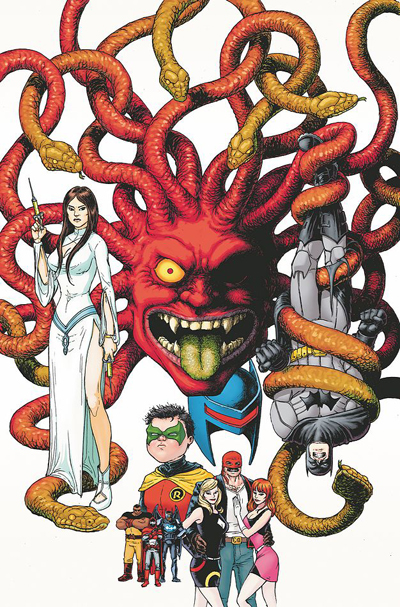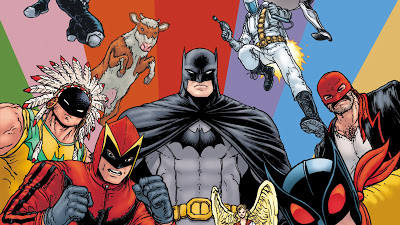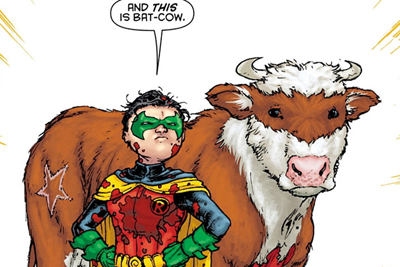 Last night I finished up Batman, Incorporated #13, which was both the last issue of the series and the last issue in Grant Morrison’s Batman run. Batman, Incorporated was so wonderfully strange when it started: the idea of Batman setting up a whole new organization of Batman-branded heroes/vigilantes was both uncomfortable and exciting, and clearly perfect for someone like Grant Morrison to lead.
Last night I finished up Batman, Incorporated #13, which was both the last issue of the series and the last issue in Grant Morrison’s Batman run. Batman, Incorporated was so wonderfully strange when it started: the idea of Batman setting up a whole new organization of Batman-branded heroes/vigilantes was both uncomfortable and exciting, and clearly perfect for someone like Grant Morrison to lead.
Over its run, of course, the world changed, with The New 52 introduced, a change of artists, a long pause that was so long I thought the book was cancelled, and then this burst of issues toward the end, culminating with the death of Damian, followed by a fairly wrenching few issues of a truly beaten and worn Bruce Wayne.
I won’t go in to spoiler territory, mostly because my memories of the title truly just blend together so much that it’s hard to figure out what story was told in what issue and in what order, which, of course, is kind of the glory of reading a comic series from its beginning to its end. So much life happens, that when a series does end, you are almost forced to just stop and think, “what just happened?”
The run of Batman, Incorporated really kind of mirrored my experience with comics over the past few years. A burst of tremendous interest, then a flagging energy, a long pause, then a renewed enthusiasm. The title introduced us to some really interesting characters from around the world, reminding me again just how much I do enjoy dipping into other countries and seeing Grant have fun with different kinds of villains with totally different agendas, including Lord Death, from the Batman manga from the 1960s.
Batman, Incorporated is interesting, just from a historical point of view, because it began prior to The New 52, then continued as part of the second wave of the pseudo-reboot, but with the continuity pretty much intact. The construction of both volumes (first being pre-New 52 from 2010-2011, the second starting in March of last year) was pretty different as well, with the first run featuring two-issue story arcs, jumping from country to country. After the fifth issue, there was a one-shot story called “The Leviathan Strikes,” which prepped things for the second volume, focusing on Leviathan and Talia Al Ghul. The second volume goes from there and pretty much covers a single arc (with #12 being a welcome respite), culminating in Damian’s murder and the aftermath, featuring a return of a key character that was introduced way back in the first volume of the series — and I am not referring to Batcow, which I thought was kind of lame at first but now kind of love.
As I look back at this (thank you Wikipedia), it just makes me chuckle a bit. It’s just perfectly convoluted, this whole book. Starts off with the best of intentions, disappears, comes back, ends up killing a character that everyone hated at first then really loved, then just stops, all while the rest of Batman and the rest of The New 52 is happening. It’s like an Elseworlds book, but, of course, given the impact it had on the Bat-family, it had to be in continuity. I am not sure how successful it was from a sales point of view, but I am glad it happened and I am glad I stuck with it.
The end of a series is always kind of a wake-up call, of course, even when it happens at 1am. It’s like you are on a train, a train you’ve been on so long that you’ve actually forgotten where it’s supposed to go…when suddenly, you get to a stop. You rub your eyes, glance at your luggage and notice that the conductor is there, waiting to see if you ready to get off now. You are welcome to stay, but this train, the comics train, is going somewhere else now, and while you can always hop off while the train is moving, you rarely get an opportunity to get off with your luggage and your sense of direction intact.

We’ve gone through the ends of series (or ends of major arcs) before, of course. Local, Ex-Machina, New Avengers, Alias, Daytrippers, Powers (which is a special case worthy of another article—like, what the hell happened with that book?)…these are stories we began and ended together, which is a fun feeling. Then I look at the possibility of getting the inevitable trade of the whole run and realize that, in the end, reading it all in trade in one sitting, while it might make more sense, like, literally, the whole story will flow much more nicely, it won’t have the same emotional impact as having had the chance to be part of the story over three years’ time.
Batman, Incorporated sticks with me for some reason, probably because it was just one of those books that was just something different, unlike any of the other DC books I was reading. I had very little experience with Yanick Paquette, whose visual style made this book pop when it first launched, and there was a real pulpy sense of fun surrounding the book, at least during the first volume. I felt like DC just kind of handed over the Bat-reins to Grant and his artists and there was a sense of optimism and enthusiasm about the character that was really exciting, a lightness to the series that was really kind of refreshing. The last few years of Batman have been fantastic, of course, but I can’t really say it has been all that fun, which is what Incorporated, at least in the beginning, was all about.
What is interesting about good Batman books is that that problems and challenges he faces are so specific to him, so personal (even when the stakes are global), that you almost never wonder, “Why doesn’t he just call Superman in for some help?” (I often do this with other comics.) When you read a really good Batman story, there are no other heroes out there who can help; either he won’t let them or they just wouldn’t know where to begin. The overall arc with Batman, Incorporated — and there is one — is one of those stories, where Batman and the rest of his Bat-allies are the only heroes who can save the day. I think this speaks a lot to how well Grant understands the characters; he creates villains and situations where it’s not just about destruction, it’s about pain, personal pain, that really challenges and torments our heroes. When Batman says that Robin’s death will be avenged…well, you know that moment is earned. Batman is not an easy character to write, and I think Morrison’s work in this run is some of his best Bat-writing in his career. And let’s not forget for a moment the great art we’ve had along the way, starting with Yanick Paquette, ending with Chris Burnham, with a little Frazier Irving thrown in for good measure.
 When Damian was killed in the 8th issue, I actually stopped reading the book for awhile, and ended up reading the last few issues all at once last night. As I have written previously, the kid’s death really stuck with me, and I just kind of drifted away, which was too bad, because I really appreciated how Morrison and Burnham conveyed Bruce’s incredible grief and anger regarding the loss of his son. Who would have thought that it would be in the pages of Batman, Incorporated we would get some of the most personal moments with Bruce Wayne? This was the first time that I really saw the character age. I also find myself wondering, for the first time, how much longer I should, myself, stay with the character. What more can I experience with this man? I’ve seen his parents die, I’ve seen two Robins die, I’ve seen him die…I’ve seen him in love, I’ve seen him lose that love…now what?
When Damian was killed in the 8th issue, I actually stopped reading the book for awhile, and ended up reading the last few issues all at once last night. As I have written previously, the kid’s death really stuck with me, and I just kind of drifted away, which was too bad, because I really appreciated how Morrison and Burnham conveyed Bruce’s incredible grief and anger regarding the loss of his son. Who would have thought that it would be in the pages of Batman, Incorporated we would get some of the most personal moments with Bruce Wayne? This was the first time that I really saw the character age. I also find myself wondering, for the first time, how much longer I should, myself, stay with the character. What more can I experience with this man? I’ve seen his parents die, I’ve seen two Robins die, I’ve seen him die…I’ve seen him in love, I’ve seen him lose that love…now what?
I sit in this train and I see notions of a new “Year Zero” as a next destination and I find myself settling in, because I know it’s not a long trip and that it should be pretty gorgeous to look at, but I wonder, truly, what’s next for me. Batman, Incorporated was such a long journey, one that ended so tragically, that I have to wonder if I need to stop reading Batman for a bit.
Perhaps this kind of thinking is pretty much par for the course when you reach the end of a series, but this one was strange—31 months is a pretty long time to get through 14 books. It just seems surreal. When the trade comes out, there’s just no way for a new reader to really realize just what it felt like to get to the last panel. The comics world has changed a lot since November 2010, and you get the feeling that the creators really had to work to get this book out, each issue seemed to be a result of some kind of struggle.
So there you go. I really had no idea I was going to write about Batman, Incorporated, but I saw that the series was suddenly ending and I had five issues to read, it just kind of happened. I am sad that the book is gone, it represented a very special time for comics, and a particularly exciting time for the Batman characters. I loved the chance to see other heroes who, inspired by Batman, took to the streets to fight for justice. I loved the pulpy, hi-jinx filled storylines, and even when I didn’t understand what the hell was happening (as is often the case with Morrison), it was still unlike anything else I was reading. I loved (and hated) the stakes…and was transfixed by the loss of Damian.
All in all, a great title. Like Robin, it will be missed.
Mike Romo, Inc, is an actor in LA. You can email him, follow him on twitter, or drop a like his way on Facebook!


nice article.
Well said…
Only the likes of Moore and Gaiman have done this before, but I got pretty emotional when Damian died.
He was entitled, so I was annoyed with him. He broke the Golden Rule then proceeded to beat up Tim, so I hated him. He DIDN’T die, so I had to tolerate him. He dawned the R, and I began to enjoy him. He teamed with his father, and I became attached to him.
He died, and I cried a little.
I think Morrison’s greatest legacy will be that he made us care about a little asshole… Then took him away.
While Incorporated was enjoyable (I TOTALLY agree with what you said about its fun atmosphere), it will be Damian that sticks with me.
I think maybe some time should be spent away from Batman. At least for those that are losing an era of the Caped Crusader… For me, it’s a good thing that time is being spent on his origin.
I raise a glass to everyone who stuck with this. A glass for Morrison, that slippery bastard. But most importantly, a glass to Damian.
Cheers
Morrison, Moore, Gaiman. Truly the trinity of modern comics.
“This is the first time I really saw this character age.” Thank you for that insight. Morrison matured both Bruce and Batman in ways previously unseen. He made him a real father instead of a mentor, had him deal with “adult” situations that he couldn’t buy or trick his way out of (his entire relationship with Talia), and hired other people to do the job for once. There was so much commentary and symbolism in this run and you just added another layer for me. Morrison did great things with these characters and it feels like the end of an era. Excellent article.
This took me on a tour of my own reading of Morrison’s run. I’ve stopped at Inc volume 1, which I’ve talked about before. I mean I love the ideas that Morrison puts in his entire run, but after “Batman & Son” it seemed to really change. Like I could only just hang onto the Train and look in thru the windows. Some of it was just so bizarre and out of left field, which turned out to be in the field the whole time and nobody mentioned that. I think a key part of Morrison’s run has been the lack of logic. Like you sit there and think, this will make sense. No, it a twisted way it might but it won’t hold up to continued scuritiny. Which makes me wonder, is this meant to be a Silver Age Batman? Is that the style Morrison is going for? I mean yeah, stuff makes sense in the story and then you think about it and its just “How did THAT work?!”.
And I’ve followed the run like you’re supposed to, from Batman & Son to Inc volume 1, everything in between those. Right now I’m gravitating towards fun comics, because honestly; my life isn’t very fun right now. It’s not terrible, but it just lacks FUN. So I need that right now. Fun. So simple, so elusive sometimes.
So maybe, just maybe, @Mike Romo convinced me to finish Inc. I mean a bunch of stuff has already been spoiled for me anyway, but I’ve come this far and Mike makes it sound so appealing. Maybe, it’ll be worth my time. Or maybe I’ll curse myself and Morrison for wasting more of my time. I don’t know.
Thinking about other stuff I watched end; Way’s Deadpool (Shut up), Ex Machina, Tom Strong, Sandman, so many others. The ending feels so…Rewarding in alot of those cases. So maybe what I need now is another ending, so I can have more beginnings.
Great article on both Incorporated and endings in general. I won’t rehash my feelings on the run (did plenty of that last week), but while it was mixed for me, I’m glad I stuck through to the end. And yes, I miss Damian, who I argue will be Morrison’s greatest legacy from his run.
As for other endings, Sandman is the first that comes to mind. I still remember reading #75 when it came out; I can get emotional just flipping through it again.
Another really satisfactory ending is Morrison’s last issue of Doom Patrol, a nice bittersweet, life goes on feeling (which is kinda ruined by DC’s decision to end the final trade not with that issue but his X-Force spoof. I mean, it;s good, if dated, satire, but gives a whole different beat to closing the volume).
I’ll miss Bat Cow and Alfred (the cat). All in all Grant Morrison did a great job on Batman.